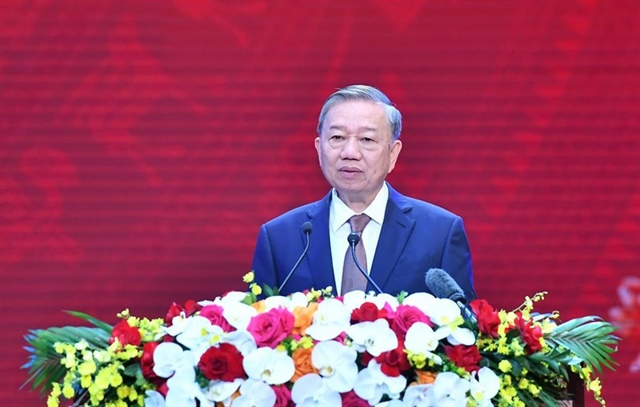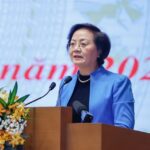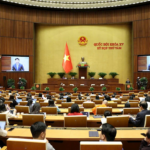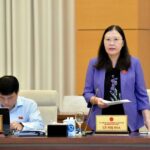
General Secretary of the Central Executive Committee of the Communist Party of Vietnam, To Lam. |
In the process of leading the Vietnamese revolution, our Party has always been deeply aware of the role of institutions and laws in the country’s development. At the same time, the Party has introduced numerous guidelines and policies on perfecting institutions and laws suitable for each historical period, achieving important results. The theoretical thinking and understanding of a socialist law-governed state have been constantly improved. Our country has formed a relatively synchronous legal system that is public, transparent, and easily accessible, basically regulating all areas of social life, including the Constitutions, Laws, and Codes on civil, business, trade, administrative, criminal, and dispute resolution matters, as well as approximately 300 other laws and codes that are still in force. This legal framework has provided the basis for socio-economic development, ensuring national defense, security, and international integration.
It can be affirmed that over the past 80 years, since the birth of the Worker-Peasant State under the leadership of the Party, our country has gained independence, unity, freedom, democracy, peace, stability, and development because we have a Constitution and successfully implement it along with other laws.
However, frankly speaking, there are still many limitations and shortcomings in law-making and enforcement. Some of the Party’s guidelines and orientations have not been institutionalized in a timely and comprehensive manner. The mindset of law-making in some areas still leans towards management. The quality of laws has not kept up with practical requirements, with some overlapping and contradictory provisions that hinder enforcement and are not conducive to promoting innovation, attracting, and unleashing investment resources. The delegation and decentralization of power have not been strong enough, and administrative procedures remain cumbersome and convoluted, resulting in high compliance costs. Law enforcement remains a weak link, lacking a timely and effective policy response mechanism. There are delays in researching and issuing policies and laws to address new issues and create a favorable legal framework to promote new growth drivers.
Currently, the world is undergoing epoch-making changes with rapid, complex, unpredictable, and hard-to-forecast developments. Along with this, the scientific and technological revolution is opening up infinite development space based on knowledge and human potential. Domestically, after nearly 40 years of renewal, our country has achieved great and historically significant achievements. From a poor, backward, and war-torn country that was under siege and isolation, Vietnam has become a development model for many countries in the world, where “everyone has enough food and clothes and access to education.” In 2024, the size of our economy ranked 32nd in the world. Our economic, political, cultural, social, scientific, and technological strengths, as well as national defense and security, have been constantly consolidated. Foreign relations have been expanded, and the country’s position and prestige have been continuously enhanced.
To realize the nation’s aspiration to rise, we must address many tasks, among which a very important one is to continue to focus on perfecting institutions and laws to unleash the full productive forces, unblock all resources, promote the country’s potential and strengths, and seize all development opportunities. Therefore, along with carrying out the revolution in streamlining organizational apparatus and striving for double-digit economic growth, law-making and enforcement must be fundamentally renewed. Meeting this demand, on April 30, 2025, in the sacred and heroic atmosphere of the 50th anniversary of national reunification, the Politburo issued Resolution No. 66-NQ/TW on “Innovating law-making and enforcement to meet the requirements of national development in the new era” – a special and extremely important resolution with many strategic decisions. The main objective of this resolution is to create a truly democratic, equal, safe, and transparent society where the people are the masters, making decisions on important issues of the country; modern social governance and development are promoted, and people’s lives are improved in all aspects, while firmly safeguarding the Socialist Republic of Vietnam.
The resolution sets the goal that by 2030, Vietnam will have a democratic, fair, synchronous, unified, public, transparent, and feasible legal system with a strict and consistent implementation mechanism. This legal system will provide a legal basis for the normal, continuous, and smooth operation of agencies after the organizational apparatus is rearranged, removing obstacles arising from practice and paving the way for development. It will also mobilize all people and businesses to participate in socio-economic development so that by 2030, Vietnam will be a developing country with a modern industry and upper-middle income. By 2025, we will basically remove the “bottlenecks” caused by legal regulations. By 2027, we will complete the amendment, supplementation, and promulgation of new legal documents to ensure a synchronous legal basis for the operation of the state apparatus according to the three-tier government model. By 2028, we will perfect the legal system on investment and business, contributing to making Vietnam’s investment environment among the top three in ASEAN. By 2045, Vietnam will have a high-quality, modern legal system that meets international advanced standards and practices and is suitable for the country’s reality, strictly observed, consistently respected, effectively guaranteed, and protective of human rights and civil liberties. The supremacy of the Constitution and the law will become the standard of behavior for all subjects in society, and the country will be governed by a modern state apparatus that is streamlined and effective in terms of capacity, power, and efficiency.
According to Resolution No. 66-NQ/TW, law-making and enforcement innovation in the coming time should adhere to five guiding viewpoints, with the most important one being to “ensure the Party’s comprehensive and direct leadership in law-making and strengthen the Party’s leadership in law enforcement.” The resolution also emphasizes that “law-making and enforcement innovation is the ‘breakthrough of breakthroughs’ in perfecting the country’s development institutions in the new era and a key task in the process of building and perfecting the Vietnamese socialist law-governed state of the people, by the people, and for the people under the leadership of the Party.” The resolution requires that law-making must be closely based on reality, “standing on the practical ground of Vietnam,” selectively absorbing the essence of human values, ensuring systematicness, seizing all opportunities, opening up, and unblocking all resources. It aims to turn institutions and laws into a competitive advantage, a solid foundation, and a strong driving force for development, creating room to promote double-digit economic growth, improve people’s lives, ensure national defense and security, and enhance the country’s foreign relations. It also emphasizes the need to improve the effectiveness of law enforcement and focus on building a culture of law observance. The resolution affirms that investing in policy and law-making is investing in development.
To bring Resolution No. 66-NQ/TW to life and achieve practical results, the entire Party, people, and army need to thoroughly grasp and effectively implement the tasks and solutions in the resolution, especially the following basic tasks and solutions:
First, ensure the Party’s comprehensive and direct leadership in law-making and highly promote the Party’s nature in law-making and enforcement. Party committees at all levels must comprehensively and directly lead the institutionalization of the Party’s guidelines and policies into laws and strengthen inspection and supervision of this work. Each official and party member must set an example in complying with and abiding by the law, spreading the spirit of respect for the Constitution and the law. It is necessary to determine that building, perfecting institutions and laws, and inspecting and supervising their implementation are key and continuous tasks of central ministries and sectors. The heads of ministries and ministerial agencies must directly lead and guide law-making and be responsible for the quality of policies and laws in their respective fields.
Second, innovate thinking and orient law-making towards ensuring state management requirements and encouraging creativity, unleashing the full productive forces, and unblocking all development resources. Law-making must fully, correctly, and promptly institutionalize the Party’s guidelines and policies, starting from the country’s overall interests, and resolutely abandoning the mindset of “if it cannot be managed, it should be prohibited.” It should promote democracy, respect, effectively ensure, and protect human rights and civil liberties, ensuring a reasonable balance between the degree of rights restriction and the legitimate interests to be achieved.
Legal provisions must be stable, simple, and easy to implement, with people and businesses as the focus. It is essential to value and proactively research strategies and policies early on, based on practical experience and global best practices, to enhance the predictability and improve the quality of law-making. In addition to some codes and laws regulating human rights, civil liberties, and judicial proceedings, which need to be specific, other laws, especially those governing development-oriented matters, should only outline framework issues and matters of principle within the competence of the National Assembly. Practical issues that frequently change should be assigned to the Government, ministries, sectors, and localities to ensure flexibility and practicality.
In the immediate future, it is necessary to focus on creating a favorable legal environment that is transparent, safe, and has low compliance costs, thoroughly cutting and simplifying unreasonable investment, business, and practice conditions and administrative procedures. Promote startups, innovation, and improve the investment and business environment. Ensure the substantive right to freedom of business, property ownership, and freedom of contract, equality between enterprises of all economic sectors, with the private economy being the most important driving force of the national economy. Focus on building laws on science, technology, innovation, and digital transformation. Urgently amend and supplement legal documents to meet the requirements of streamlining the political system organization, rearranging administrative units, and decentralizing and delegating powers to the maximum extent under the principle of “localities decide, localities do, and localities take responsibility,” along with restructuring the new development space in each locality. Build and perfect laws on the organization and operation of judicial and judicial support agencies in line with the goals and orientations of judicial reform.
Third, create breakthroughs in law enforcement. It is essential to promote a high sense of service to the people, a development-oriented mindset, and actions for the common interest among civil servants, public employees, and officials. Prioritize ensuring the effectiveness of law enforcement to promote socio-economic development, science, technology, innovation, digital transformation, and other important areas of civil life. Focus on building a culture of law observance, ensuring that respect for the Constitution and the law becomes the standard of behavior for all subjects in society. Pay attention to the work of explaining and guiding the application of laws. Strengthen dialogue, receive and listen to reflections and suggestions, and promptly resolve legal difficulties and obstacles of individuals, organizations, businesses, and localities. Regularly evaluate the effectiveness of laws after their promulgation, promote the application of technology, and build a mechanism to timely identify and comprehensively address “bottlenecks” arising from legal regulations.
Fourth, improve the efficiency of international cooperation in international law and law. Enhance the capacity of Vietnamese agencies and organizations to ensure the full implementation of international legal obligations and effectively participate in the development of international institutions and laws and the shaping of the international legal order. Effectively handle international legal issues, especially investment and international trade disputes. Implement special mechanisms to attract, recruit, train, and foster high-quality human resources with practical experience in international law and international cooperation in law and dispute resolution, and develop a strategy to increase the presence of Vietnamese experts in international legal organizations and international tribunals. Expand international cooperation in law and justice.
Fifth, implement breakthrough solutions to improve the quality of legal human resources, promote digital transformation, and apply artificial intelligence and big data, along with special financial mechanisms, in law-making and enforcement. Implement special and superior policies and appropriate remuneration and contracting regimes to attract and improve the quality of human resources involved in law-making and enforcement tasks and activities. Pay attention to investing in improving the quality of strategic research institutions and legal research institutions of central agencies. Prioritize resources for building and developing information technology infrastructure, big data, and applying digital technology and artificial intelligence to innovate and modernize law-making and enforcement. Immediately implement the project to build a large database on laws and the project to apply artificial intelligence in law-making, inspection, and review of legal documents. Innovate the mechanism for allocating, managing, and using the budget for law-making based on the principles of timeliness, correctness, and sufficiency, linked to contracting according to the results and products of each task and activity. Establish a fund to support policy and law-making.
A high-quality legal system that is suitable for the practical development requirements and the aspirations of the people is the foremost factor determining the success of a nation. Therefore, to make our country develop strongly, we must resolutely say “no” to any limitations or shortcomings in institutions and laws and not compromise with any weaknesses in policy design, law drafting, or enforcement.
With the will and valuable experience accumulated by our Party during 95 years of leading the revolutionary cause of the nation, 80 years of leading the State in building institutions and laws, especially 40 years of renewal, along with the participation of the entire political system and the support of the people, we will definitely succeed in innovating law-making and enforcement, leading the country into a new era of prosperity, civilization, and development. Let’s build our country “ten times more beautiful” as Uncle Ho once wished.
TL
– 15:55 05/04/2025
The Week of November 25-30: Parliament Concludes Session with Key Personnel Appointments
In its final week of the 8th session, the 15th National Assembly of Vietnam will deliberate on several significant agenda items before concluding on November 30th. This pivotal week, commencing November 25th and enduring until the 30th, encapsulates pivotal discussions that will shape the nation’s trajectory.
“The Cost of Corruption: A Devastating Blow”
The total value of assets lost to corruption cases under investigation is estimated at a staggering 4,586 billion VND, including 59,899 square meters of land. Authorities have successfully retrieved, seized, or temporarily confiscated approximately 1,535 billion VND, 45,303 square meters of land, and 1,444 land-use right certificates.




















